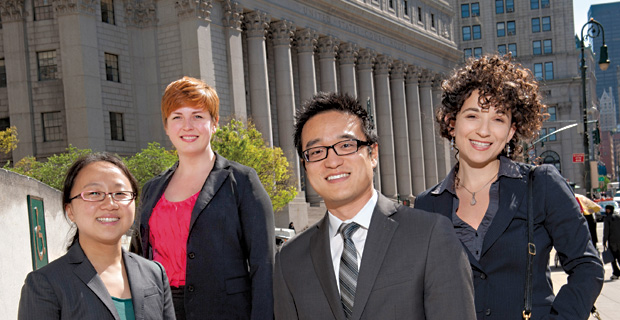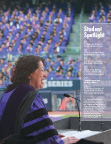Solicitor General Proves No Match for the IRC
Printer Friendly VersionEven for a clinic accustomed to high-profile wins, the Immigrant Rights Clinic (IRC), taught by faculty co-directors Nancy Morawetz ’81 and Alina Das ’05, has had an extraordinary year. A report from the clinic exposed mistreatment of immigrants in New Jersey detention centers, and the Supreme Court cited a brief prepared by IRC students in which the students argued that a 1996 law barring reentry to the U.S. by immigrants convicted of crimes should not apply to immigrants who have only pre-1996 convict ions. But perhaps the biggest win came for a Freedom of Information Act request filed in 2011. After all, it’s not every day that the Office of the Solicitor General confesses error and the Justice Department alters immigration procedures for deportees—thanks to two years of hard work by six recent graduates.
In 2011, IRC students Wonjun Lee ’12, Julie Mao ’11, Saerom Park ’12, Nikki Reisch ’12, Martha Saunders ’12, and Nancy Steffan ’11 asked the Justice Department to turn over a group of e-mails that discussed the government’s purported policy and practice of returning deportees. This spring Park and Saunders faced off against U.S. attorneys representing the Department of Homeland Security, withstanding rapid-fire questioning by Judge Jed Rakoff of the U.S. District Court for the Southern District of New York. The students prevailed; the judge ordered the Justice Department to disclose the bulk of the e-mails.
In April, the consequences of this ruling played out in the upper echelons of federal government. The Office of the Solicitor General said it would “clarify and correct” a 2009 statement to the Supreme Court in which it erroneously implied that the government already had procedures in place to ensure the return of deportees who win their immigration appeals. And the Justice Department announced it would implement new procedures to ensure that such deportees can return to the U.S.
The developments were a reminder of the importance of this type of work, something the judge pointed out on the bench. “It was really interesting to hear Judge Rakoff talking about how our case had made a difference in ways that he himself found surprising,” says Morawetz.
Reisch, who presented arguments with Lee in front of Judge Rakoff in May to request the release of additional documents related to deportation procedures, says the collaboration among the students working on the case this year—Lee, Saunders, Park, and Reisch—was critical to the success of their FOIA request. Supervised by Morawetz, they worked together over several months to fine-tune every aspect of their arguments, challenge one another with different lines of questions, and edit practically every line of their written briefs.
That’s how Reisch was able to deliver a strong rebuttal in Judge Rakoff’s courtroom this May. “Wonjun and I had both mooted each other, so we were prepared,” she says. The graduate, who is clerking for Judge Marsha Berzon of the U.S. Court of Appeals for the Ninth Circuit this year, says she discovered her passion for oral advocacy through working on cases with the IRC. On another case, Reisch had the opportunity to argue at the Third Circuit—an experience she calls both exciting and intimidating.
“If you’re on the side of justice,” says Reisch, “there are ways to make that come through in the stories you tell and the way you go about your litigation.” In other words: Fight with passion.
—

